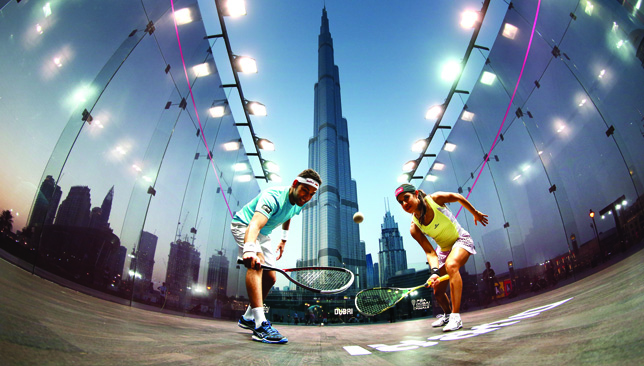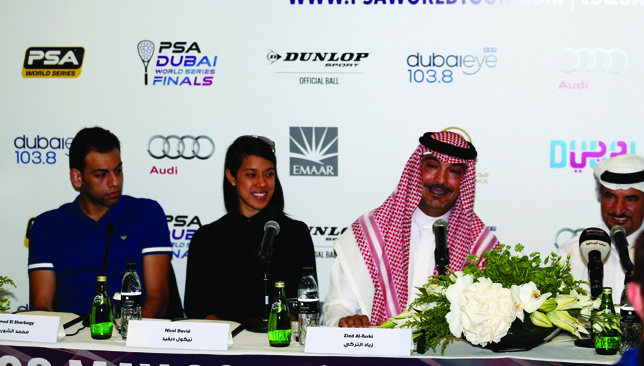
When squash touches down in Dubai this week for the PSA World Series Finals, it may seem like just another event that has been added to a crammed UAE sporting calendar.
But for the sport itself, this tournament – staged at the foot of Burj Khalifa from until Saturday – is a chance to showcase to the rest of the world what squash is all about, and it’s an opportunity to attract big name sponsors to help carry it forward. For a sport which has been working tirelessly to enhance its profile and expand its global appeal, placing a glass court in front of the tallest building in the world is definitely a smart, eye-catching move made by the PSA (Professional Squash Association), and it is one they hope will pay dividends.
The World Series Finals features the top eight men and women in the Road to Dubai rankings and poses as the finale for the squash season, the same way the ATP World Tour Finals and WTA Finals wrap up the tennis season each year.
“In 2009 I took over the World Series Finals. My involvement in squash was really to raise the bar to bring the sport to the level I thought it deserved and give these tremendous athletes the world recognition that they deserve. I used this tournament really as a catalyst to push the sport,” says PSA chairman Ziad Al Turki, who is the man behind the revitalisation of the World Series Finals.
“Dubai has more ‘pizazz’, being in front of Burj Khalifa, I think it will attract a lot of media attention. It’ll be the catalyst to take squash to the next level.”
While he refuses to take credit for it, Al Turki has been a driving force behind the sport’s progress. His involvement with squash officially began in 2005 when he held the Saudi International at his home nation Saudi Arabia, offering the highest prize money ever witnessed in the sport.

Passion for progress: PSA chairman Al Turki (r) is bringing squash to new levels.
After years of sponsoring players and promoting squash, Al Turki was elected chairman of the PSA board in 2008 and has since made it his life’s mission to elevate squash to a place it deserves.
“I got into squash specifically to improve the players’ life. I wanted to raise the prize money, I wanted squash to be in the limelight like it deserves because it is an incredible sport,” he says. “People have this impression that it’s old men in little white shorts and when you watch it you realise how incredible it is, it’s Formula One with a racquet. We want to get squash to the same level as all other racquet sports whether it’s in income or viewership, that’s really our aspiration.”
Previously condemned as a sport that does not televise well, squash long suffered from poor TV production values. Al Turki and the PSA board explored ways to further enhance the television experience. They revolutionised the court design, altered the colour of the ball, studied the camera angles and basically overhauled the entire production process. Today, PSA World Tour matches are broadcast live on beIN Sports in the Middle East and North Africa, BT Sport in the UK, Eurosport in the rest of Europe, and Tennis Channel in the US. In 2010, SquashTV, an online streaming subscription service, was launched showing 200 live matches in its first year – a number which has now gone up to over 400.
“I think the struggles we had are in the past. As you can see, all the misconceptions were ‘we’re not going to be live on television, we’re not going to get big sponsorship behind us’ and look, we’re here in Dubai, we’ve got major funding behind us, we’re live on television throughout the world… So we’ve shown we’ve done all the positives,” explains Al Turki.
“Squash is a sleeping giant that has the ability to grow exponentially over the next few years. Compelling, exclusive, diverse and relevant content is fundamental in growing the audience and enhancing fan engagement, and professional squash offers just that.”
Still, all the efforts exerted by the PSA did not warrant a nod from the International Olympic Committee which snubbed all of squash’s attempts to join the Olympics, including two rejected bids to be featured at the Tokyo 2020 Games.
“When it comes to the Olympics, the PSA has done all it can in terms of ticking all the boxes,” insists Al Turki. “The World Squash Federation I think fell short. I’m also the president of the Saudi Squash Federation and in the last AGM (Annual General Meeting) I told them they have to change, the same way we changed in the PSA. They need to overhaul themselves.”
Indeed, the professional tour has gone above and beyond when it comes to embracing change. A historic deal at the end of 2014 saw the PSA merge with the Women’s Squash Association (WSA), which brought together the men’s and women’s tours under one umbrella.
The sport is also pushing for equal prize money and for the first time ever, the 2017 World Championships will offer men and women the same prize pot and both events will be staged together.
“We’re all for parity in prize money and this tournament (in Dubai) is equal prize money. I always say ‘leave it for Saudi to push for women’s squash’. This Dubai tournament, the winner will have the biggest cheque written to a female squash player in the history of the sport and it’s almost double what the highest is right now. You look at the US Open, it’s equal prize money, so is JP Morgan Tournament of Champions,” says Al Turki, who believes both tours joining forces has been beneficial for the sport as a whole.
“We have already seen many positives from the amalgamation of the men’s and women’s tour. It has led to cost savings which we have been able to invest into the broadcast production. Additionally the value of our broadcast and sponsorship propositions has increased significantly now that we have brought the men’s and women’s tour under one roof. We now have a solid foundation in place for the commercial growth of the sport at professional level.
“Initially the women will reap a few more rewards than the men, for instance with regards to broadcast and marketing, but ultimately we will be able to generate more revenue for professional squash as a whole, which will be just as positive for the men as for the women.”
Tennis remains the most lucrative professional sport for women and while Al Turki has big hopes for squash, he thinks it’s unfair to try and emulate a giant like tennis.
“But I am convinced that women’s squash will continue to go from strength to strength over the next five years just like the men,” he adds. For the PSA, many challenges still remain. While the convenience of being able to place a glass court in the middle of basically anywhere fathomable – the Cairo Pyramids, Grand Central Station and the Hong Kong Harbour have all hosted tournaments – remains one of squash’s strongest suits, the hunt for tour sponsors continues. The World Series Finals, which was first held in 1992, was not staged in the past two seasons due to host nations – one from Europe and one from the Middle East – pulling out at the last minute.
The income from selling TV rights has helped the PSA greatly in recent years but the reality remains that the prize money is so low compared to other sports that by Al Turki’s estimations, only the top-20 or top-30 men in the rankings make a living from the sport, while on the women’s side, he predicts only the top-16 are earning comfortably. He believes the situation will get better soon.
“Especially that now we’re on television so they’ll get also sponsorship. The racquet sponsors are improving their contracts with them, and now we have the numbers to prove it as well. The media exposure that you get each tournament, you really get big bang for your dollar,” says the Saudi supremo.
“We’re looking for tour sponsors yes, and we’re very close with a couple. I think the exposure we’ll get here in Dubai, hopefully we’ll announce something soon. Just the fact that Falcon and Associates had the faith in us to bring us here, the Dubai Sports Council as well, it shows.”